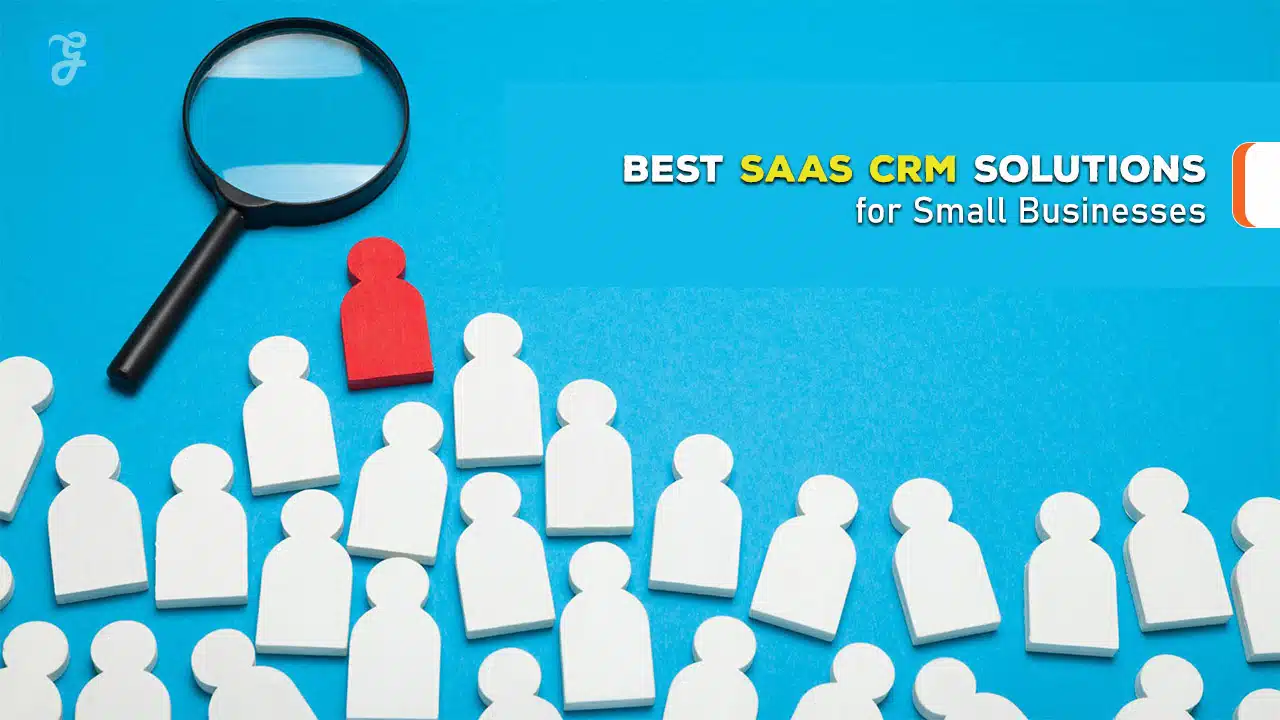In today’s competitive business landscape, managing customer relationships effectively can make or break your small business. Customer Relationship Management (CRM) software helps streamline interactions with customers, enhancing your ability to close deals, retain clients, and grow.
For small businesses, choosing the right CRM is crucial to achieving success without overwhelming costs or complexity.
With the rise of cloud technology, SaaS (Software-as-a-Service) CRMs have become increasingly popular, offering affordable, scalable, and easy-to-use solutions. SaaS CRM tools help small businesses manage sales, track leads, automate tasks, and improve customer service, all without requiring extensive technical expertise.
This article aims to guide small business owners through 15 of the best SaaS CRM solutions, providing insights into their unique features and benefits.
Criteria for Selecting the Best SaaS CRM for Small Businesses
When selecting a SaaS CRM, small business owners should consider several important factors to ensure they choose a solution that fits their unique needs. These are the key criteria you should evaluate:
1. Affordability
Small businesses often operate with tight budgets, making it important to choose a CRM that offers competitive pricing or a free plan that meets basic needs.
2. User-Friendly Interface
A steep learning curve can slow down productivity. Opt for a CRM with an intuitive interface that your team can quickly learn and use effectively.
3. Customization
Each business has unique processes, so it’s crucial to choose a CRM that allows for customization of features, pipelines, and workflows according to your specific needs.
4. Integration
Your CRM should integrate seamlessly with the tools you already use, such as email services, accounting software, or e-commerce platforms, to enhance overall business efficiency.
5. Customer Support
Reliable customer support is vital, especially when encountering technical issues. Opt for a CRM provider known for quick and effective customer service to avoid downtime.
The 15 Best SaaS CRM Solutions for Small Businesses
1. HubSpot CRM
HubSpot CRM is a leading choice for small businesses due to its free plan, which includes essential CRM features like lead tracking, email integration, and sales pipeline management.
HubSpot is known for its ease of use and offers scalable paid plans as businesses grow. Its strong integration with tools like Gmail and Outlook makes it a seamless fit for many teams. Although the free plan covers the basics, more advanced tools are locked behind paid tiers.
2. Zoho CRM
Zoho CRM stands out for its affordability and extensive customization options. It allows businesses to automate tasks, gain AI-powered insights, and connect with customers via multiple social media and email channels.
Its flexibility makes it a top pick for small businesses needing to tailor their CRM to specific business models. However, Zoho’s vast array of features can be overwhelming for new users.
3. Salesforce Essentials
Salesforce Essentials offers small businesses access to the powerful Salesforce ecosystem. It’s tailored specifically for small teams, providing features like sales automation, contact management, and a robust mobile app.
While Salesforce is known for its advanced tools, the Essentials version is designed to be simple and affordable for startups and small companies. However, the learning curve can still be steep for beginners, and some advanced features require higher-tier plans.
4. Pipedrive
Pipedrive is a CRM focused heavily on sales pipeline management, offering visual tools that make it easy for teams to track deals and automate repetitive tasks.
Pipedrive’s intuitive interface and sales-focused features make it an ideal choice for small businesses with a heavy focus on closing deals. However, its marketing features are more limited compared to other CRMs.
5. Freshsales (Freshworks)
Freshsales, part of the Freshworks ecosystem, combines sales automation with marketing features in an easy-to-use platform. It offers AI-driven insights, sales lead tracking, and integration with email and phone tools, making it a comprehensive solution for small teams.
The free plan includes basic functionality, but businesses seeking more advanced tools will need to opt for the paid plans.
6. Agile CRM
Agile CRM is a budget-friendly, feature-packed option that offers marketing automation, helpdesk, and web engagement tools. It’s one of the few CRMs that provides comprehensive features in a free plan, supporting up to 10 users.
Agile CRM is a great choice for businesses that need an all-in-one solution at an affordable price. However, the user interface can be confusing at first, especially for beginners.
7. Insightly
Insightly is a versatile CRM that combines customer relationship management with project management capabilities. This dual functionality is ideal for businesses looking to streamline both sales and project workflows in one place.
Insightly’s workflow automation and project tracking tools are particularly beneficial for service-based businesses. However, customization options are somewhat limited on lower-tier plans.
8. Monday.com CRM
Monday.com CRM is a flexible, highly customizable platform that offers visual dashboards and task management features. It’s ideal for businesses that need to manage both sales pipelines and internal projects within one platform.
While its flexibility and simplicity make it popular, Monday.com lacks some advanced CRM features like marketing automation, which may be a downside for growing businesses.
9. Copper
Copper is the go-to CRM for businesses using Google Workspace. Its deep integration with Gmail and Google tools makes it incredibly easy to use, allowing users to manage contacts, sales pipelines, and email tracking directly within the Google ecosystem.
However, businesses that don’t rely on Google tools might find Copper less suitable.
10. Keap (formerly Infusionsoft)
Keap, formerly known as Infusionsoft, is a powerful CRM that focuses on sales and marketing automation. It’s ideal for small businesses looking to nurture leads through automated workflows, email marketing, and appointment scheduling.
Keap’s powerful automation tools come at a higher price, making it less affordable for very small businesses or startups on a tight budget.
11. Nimble
Nimble excels in social CRM, helping businesses manage customer relationships through social media integrations. It automatically pulls in contact information from social platforms and syncs it with your CRM, allowing for easy communication.
Nimble’s simplicity and social media focus make it great for small businesses that rely heavily on social sales. However, it may not be the best choice for businesses looking for advanced sales automation.
12. Streak CRM
Streak CRM lives inside your Gmail inbox, making it one of the most user-friendly CRMs for businesses already using Google Workspace. It allows for seamless management of sales pipelines, deals, and contacts without leaving your inbox.
Streak is perfect for small businesses looking for a simple, email-focused CRM, but it lacks the depth of features offered by more robust platforms.
13. Bitrix24
Bitrix24 is a free, comprehensive CRM solution that offers sales automation, task management, and communication tools all in one platform. It’s ideal for small businesses looking for an all-in-one CRM with extensive features available even in its free version.
The downside to Bitrix24 is that its interface can feel cluttered due to the sheer number of features, which can overwhelm new users.
14. Capsule CRM
Capsule CRM is designed for small businesses that need a simple, easy-to-use CRM without unnecessary complexity. It offers basic features like contact management, task tracking, and integration with popular apps like Google Workspace and Mailchimp.
Capsule’s simplicity and affordability make it a great choice for startups, but it may not provide enough advanced features for rapidly growing businesses.
15. Apptivo
Apptivo is an affordable, highly customizable CRM that offers tools for sales management, project tracking, invoicing, and more. It’s an all-in-one solution that’s flexible enough to adapt to various industries, making it ideal for small businesses looking for a low-cost, versatile CRM.
However, Apptivo lacks advanced reporting features found in higher-priced CRMs, which may be a limitation for some businesses.
How to Choose the Right SaaS CRM for Your Small Business?
Selecting the right CRM for your small business requires a thoughtful assessment of your needs and objectives. Here are some tips to help you make an informed decision:
1. Define Your Business Needs
Are you primarily focused on sales, marketing, or customer support? Understanding your business priorities will help you narrow down the CRM options that best align with your goals.
2. Compare Pricing Plans
While some CRMs offer free versions, others come with subscription fees. Compare pricing plans to ensure that you’re getting the most value for your money without overspending on features you don’t need.
3. Integration with Existing Tools
If your business relies on certain tools like Google Workspace, Mailchimp, or accounting software, ensure that your chosen CRM integrates seamlessly with these platforms to streamline operations.
4. Evaluate Customer Support
Good customer support can make a huge difference, especially when technical issues arise. Look for CRM providers with responsive and reliable customer service to avoid disruptions.
5. Test with Free Trials
Many CRMs offer free trials or freemium plans. Take advantage of these to test out the software before committing, ensuring that it suits your business needs and workflows.
Conclusion
Choosing the best SaaS CRM for your small business can be a game-changer in terms of sales, customer management, and business growth. Each CRM solution discussed in this article offers unique features, catering to different business needs and budgets.
From the feature-rich HubSpot CRM to the sales-focused Pipedrive, there’s something for every small business.
Take your time to evaluate each option, consider your business needs, and start with free trials to find the CRM that best aligns with your goals.
With the right CRM in place, your small business can streamline its operations and build stronger, more profitable customer relationships.






































